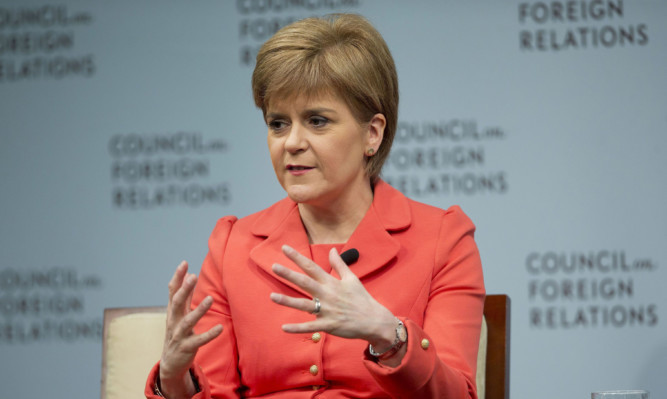The United Kingdom may not continue in its current form if the Government at Westminster fails to adapt to the changing political landscape, Scotland’s First Minister has warned.
Nicola Sturgeon said while David Cameron had been re-elected as Prime Minister after last month’s general election, his Conservative party had lost the votes in Scotland, Wales and Northern Ireland
The SNP leader, who was addressing the Council on Foreign Relations think tank in Washington DC, said: “I think it’s a big test in the years to come of the United Kingdom, the construct that is the United Kingdom, is it adaptable and responsive, can it accommodate the different views and different directions each of its nations wants to go in?
“Or will it prove to be unresponsive, in which case, perhaps, the United Kingdom will not continue as the construct it is.”
She said in “in many ways there were four different elections taking place in the United Kingdom last month” in each of the four nations, with Scotland, England, Wales and Northern Ireland producing “very different results”.
While the Conservatives won a majority in England, the SNP swept the board in Scotland taking 56 of the 59 seats up for grabs, while Labour came out on top in Wales.
This could have “very significant implications for the future of the UK,” Ms Sturgeon said.
“There was no one uniform result across the United Kingdom.
“In practical terms simply winning enough votes in seats in England can secure a parliamentary majority, but when a government is achieved only by winning seats in one of the four nations of the UK the question arises what kind of mandate is that?
“The Conservative Party has the right of course to form the government of the UK and has indeed done that, but it was not the biggest party in three of the four nations of the UK, far from it.
“So the legitimacy of its actions in those other nations comes very clearly into focus.”
She continued: “What happens to the future of the United Kingdom now in the years ahead at least in part depends on how responsively Westminster deals with the reality that in political as well as constitutional terms the UK is not a unitary state.”
Ms Sturgeon stressed that there is “no second Scottish independence referendum on the immediate horizon”.
But she stated: “If the United Kingdom is to remain intact in the years to come it must demonstrate very clearly it can adapt to multi-national and multi-party politics in a far more substantial manner than it has often done in the past.
“It is now increasingly clear that for the United Kingdom as a whole one size doesn’t fit all, and a one size all approach isn’t going to fit the bill for the future.”
She said: “The point I’m making is a point of Realpolitik, it’s a point of political reality. Because of the relative size of England compared to the other nations of the United Kingdom David Cameron is able to form a government. My argument is he needs to accept in the other three nations of the United Kingdom his party did not win and therefore in how he governs the country that’s something he should take account of.”
The First Minister also used her speech to warn that the UK is “perilously” close to leaving the European Union (EU), with a referendum to take place on the country’s continued membership.
If Scotland is take out of Europe against its will, she said that could “produce a demand for another independence referendum which may well be unstoppable”.
Fewer than 2% of Scots who voted in the general election backed those parties which want to leave the EU, she said, adding that a recent opinion poll had showed 72% of people north of the border are in favour of the UK remaining in.
With the Prime Minister and others at Westminster in favour of Europe she said: “There’s overwhelming support, or so it seems, for European Union membership in the Westminster parliament, and yet here we are in the United Kingdom standing perilously to the exit door of the EU.”
But she said including a “double majority” in the EU referendum, where all four parts of the UK had to vote for an exit before the country could leave, would “remove that possibility”.
